 Finding the best investment account to put your money and watch it grow is challenging. Investing is always seen as an overwhelming task, especially for beginner investors. Fortunately, online brokers and investing services have ushered in easy, feature rich, low cost and profitable management services. Choosing one or multiple options can help you become confident about the investment process. And you can gain new and useful insights and grow your wealth.
Finding the best investment account to put your money and watch it grow is challenging. Investing is always seen as an overwhelming task, especially for beginner investors. Fortunately, online brokers and investing services have ushered in easy, feature rich, low cost and profitable management services. Choosing one or multiple options can help you become confident about the investment process. And you can gain new and useful insights and grow your wealth.
For seasoned investors who are in search of low cost financial planning services, there are plenty of options available too. As there is a continuous influx of online financial advisors with diverse service range, finding the right service for your specific financial situation can be an uphill task.
To make your task easier, let’s look at the top-rated investment accounts and compare their features to see which is right for you. From socially responsible investment tools to human advisors the lineup below features comprehensive digital tools for financial planning. Read our review to know how you can grow your wealth without spending too much capital or time.
Compare the Top 10 Investment Accounts in 2020
Here’s a list of the best investment accounts to grow you money and plan for retirement in 2020.
- Wealthfront
- Betterment
- Acorns
- Ally Invest
- Zacks Trade
- E*TRADE
- TD Ameritrade
- Fidelity
- Vanguard
- Wealthsimple
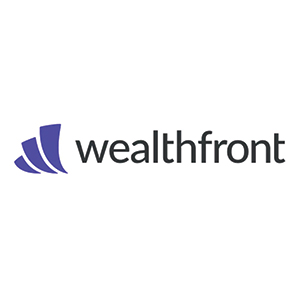 Wealthfront
Wealthfront
If you are looking to grow your wealth by investing sans the hands on approach, Wealthfront is an ideal choice. Wealthfront is an investment account management service established in 2011. The platform specializes in automated investment planning, cash accounts of high yield and provides credit for brokerage account clients. Since its inception its AUM (assets under management) have increased to $11.5 billion
Account Tools & Features
Wealthfront working principle is simple. When you invest money starting from $500, which is the minimum amount needed in Wealthfront, the funds are held at Royal Bank of Canada. Wealthfront allocates the invested amount to various Exchange traded funds (ETFs) that are low cost and cover 11 different asset classes excluding cash namely US, Foreign, Emerging market and dividend stocks, municipal, corporate and US government bonds and real estate.
The main investment features include:
- Tailored transfers
- Referral program
- Tax loss harvesting at stock level
- External account management
- Line of credit on investments bigger than $100,000
- Retirement savings
- Cash account with 2.57% interest rate with FDIC insurance of maximum $1 million
Fees and Pricing
$500 is the minimum account value required by Wealthfront. The minimum amount you can withdraw in $250. Annual fees for accounts under $10,000 is 0.25%
The promotional offer can avail you free management of your account for the first $5,000 you deposit. For all amounts over $5,000, 0.25% is the annual fee.
The other charges that are added include, the average fee charged for the ETFs, which is 0.18%
Pros
- Free account management for accounts less than $5,000
- Tax loss harvesting for all types of accounts including stock level
- Risk parity feature helps balance the returns on the bonds and stocks.
- Cash Account can be opened with a minimum of $1 at 2.57% interest rate and FDIC insurance of $1 million.
Cons
- Does not offer fractional shares so your cash may not be invested
- Does not offer discounts for large balance accounts
Bottom line
Looking at the working principle features and pricing, Wealthfront is a good investment service that excels in taxable accounts. You can minimize the expenses related to annual taxes. For beginner investors and the passive investor, Wealthfront offers a viable choice. However passive investors should have balancing external holdings of cash type while active investors should have supplementary self-directed investment account while using Wealthfront services.
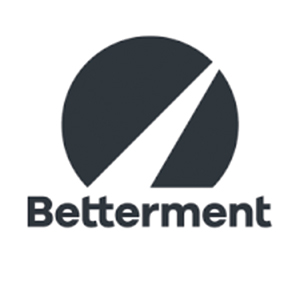 Betterment
Betterment
Betterment established in 2008, is an investment manager operating exclusively for US customers. It offers low account management fees and easy to customize portfolios. The company is regulated by FINRA (Financial Industry Regulatory Authority) and the SEC (Securities and Exchange Commission).
It is a pioneer in automated investments and technology aided portfolio recommendation. The company provides assistance with human advisor over phone or the facility to buy a financial advice pack that is fully personalized. For customers who lack the fundamental skills in investing money or allocation of assets, and for those who find the professional financial advisor fee exorbitant, the automated investment accounts like Betterment offer a good option.
Account Tools & Features
Betterment can be used in multiple ways. You can sync all financial accounts you have and get the overall asset outlook without investing or you can invest in the portfolios provided by betterment. The portfolios are flexible allowing you to customize according to your requirements. The taxable accounts at Betterment provide maximum after tax returns due to tax loss harvesting method.
The portfolio types offered include:
- Globally diversified ETFs on bonds and stocks
- Socially responsible investment portfolio that has stocks that have high social impact and environmental scores
- Goldman Sachs Smart Beta portfolio
- Blackrock ETFs made of bonds that are completely income based
- Flexible portfolio
Other important features include SmartDeposit feature that allows automatic deposits, if the bank balance increases beyond a fixed amount, 2-factor authentication, Betterment app and financial advice packages.
Fees and Pricing
Betterment offers two main pricing plans namely, Digital and Premium plans. The former has an annual fee of 0.25% with facility to send and receive messages from financial experts via its App, Retireguide, and tax loss harvesting and rebalancing. Premium plan is for accounts with over $100,000 and has a 0.40$ annual fee. It includes messaging through app, unlimited CFP calls and external investment assistance.
Pros
- Transparent portfolios
- Customize portfolio or alter risk any time
- Sync individual goals with external accounts
- Account is digital and easy and fast to setup
- Analyze accounts that are outside the platform
- Low management fees
Cons
- Fees charged to standard plan users for financial planner advice
- Portfolio does not allow secured loans, borrowing or margin lending
- Allows USD based investment accounts
- Does not allow overall allocation of assets including those outside Betterment.
Bottom line
The presence of human advisers, low fees and flexible portfolio options are great for investors in search of best strategies to boost their investment portfolios. The tools and features give holistic help in maximizing portfolio and meeting your goals. The zero minimum account balance is another advantage for basic users. While conservative and older investors in search of retirement portfolio management may find the digital version difficult to adopt, it is ideal for the younger investors.
 Acorns
Acorns
Acorns investing app allows automatic investment of the spare change left in purchases made via a linked debit or credit card. The portfolios at Acorn are created with the assistance of Dr. Harry Markowitz, the noble prize winning economist. The ETFs in the portfolio are structured from reputed investment management companies. The company, with a current market value of $860 million, has received accolades for luring millennial into investing.
In contrast to investment services like Wealthfront and Betterment, Acorns is a basically developed for mobile use. It was initially accessible as Android or iOS app and later on the web version was launched.
Account Tools & Features
Acorns does not require minimum amount to open an account. Investing begins once you accumulate $5. The company builds an ETF based portfolio automatically using 7 different asset classes and keeps rebalancing so you can track it regularly. The features of this tool include certain terms like roundups, which indicate the change present between your purchase and the subsequent dollar is rounded up on the linked credit or debit card and it is invested automatically.
Additionally there is found money, which is the additional money included in the account when you shop using Acorns partners. The offerings of Acorns are of three types:
- Acorns Invest is the chief offering also termed as Acorns Core. This is the basic account that allows investment of spare change.
- Acorns Later is the IRA account, which charges $1 per month for the first $1 million and above the value the charge is $100 for every million.
- Acorns Spend is the debit card and checking account of Acorn, which helps save and invest every time you purchase without the need for manual linking of account.
Gift cards feature is a new offering where you can select a particular amount and it is deposited automatically to the recipient and when they sign up for Acorns the amount is invested.
Fees and Pricing
The fees are $1 per month for accounts that have a balance below $1 million. The fees increase to $100 per month for every additional million invested. The fees are very low when you consider the conventional mutual funds, ETFs and other investment management services. However this can turn out to be a high fee, if your account balance is very small. For instance, if you have $100 in your account, the fee in assets percentage is high at 12%. But the percentage decreases with higher account balance. It is 0.24 for $5,000 and 0.12% for $10,000. And the fees for moving investment from Acorns is $50 for an ETF, which is very steep when compared to other providers.
Pros
- Spare change is automatically invested
- Select retailers offer cash back for Acorns account
- College students get free management service
Cons
- Small account balances have high fees
- Investment portfolio is not diverse
Bottom line
For millennials wary of investing, Acorns is a choice to consider. The zero fee charge for college students is a big advantage. Other than accounts with smaller balance that attract higher fees, Acorns is a tool that is ideal for you, if you are not into saving or are new to investing. It helps you started on your investment journey and for those who already have investments it acts as a good supplement. However it is not for retirement investment account.
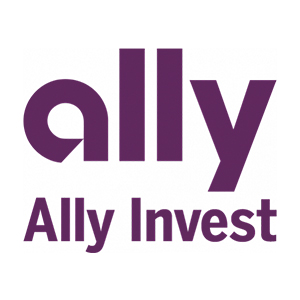 Ally Invest
Ally Invest
Ally Invest, which was called as TradeKing earlier, is part of a company dealing in financial services such as lending and banking. The investment service deals in diversified asset classes. The company focuses mainly on providing easy, convenient and affordable tools chiefly for millennial users. This online discount brokerage deals in trading of $0 stock and ETFs. The company provides investors basics needed for conducting detailed stock research. You can find deep insights on stocks, mutual funds and ETFs with the clean design of the company. It is part of Ally Financial, the parent company, which is reputed for its auto financing, home loans and online banking services and has over 6 million customers.
Account Tools & Features
Ally provides over 500 ETFs free of commission. It has a huge mutual fund inventory. There is a separate platform for forex trading. The company also has fixed income products. Accounts of value $100 or over it are given cash enhanced managed portfolio with no annual fee. Ally provides cash bonuses ranging from $50 to maximum of $3,500 on deposits with $10,000 as minimum qualifying amount. Fund investors will find Ally a useful tool as it offers a low fee of $9.95 for mutual fund purchase through its service. When compared to TD Ameritrade and E *Trade the margin rates are lower at Ally. The best advantage of choosing Ally Invest is you can open an account with a minimum of $1 to begin with.
Fees and Pricing
No commission fees are charged for regular ETF and stock trades at Ally Invest, while options trades are charged $0.05 for a contract. The $9.95 fee for mutual fund trades is lower than other full service competitors. The charge for penny stocks is $4.95 with $0.01 as additional charge for a share.
Pros
- Is ideal for trading with options, forex, active trading and for commission free trading.
- Low fees for trading and non-trading
- Digital account opening is easy and quick
- Educational and research tools are good
- No minimum account balance is required
- Web based platform is very strong
Cons
- Trading can be done in US markets alone
- Need a separate account for Forex trading
- High margin rates
Bottom line
The convenient and simple web based platform, good pricing and $0 account minimum makes it ideal choice for beginner investors. Active investors also find the trades free of commission a good deal. However if you are looking for purchasing mutual funds without transaction fee, this is not the choice.
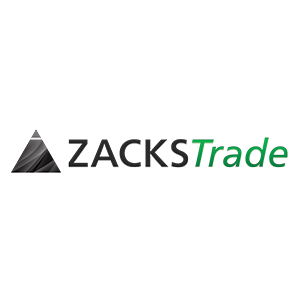 Zacks Trade
Zacks Trade
Zacks Trade based in Chicago, Illinois is a brokerage platform focused on investors in multiple securities and those interested in active day trading. Founded by Len Zacks, who owns Zacks Investment Research, Zacks Trade provides good opportunity to purchase bonds and stocks. The real advantage of using Zacks Trade is the two in-depth and complex platforms it provides for aggressive trading.
Zacks Trade provides trades of penny per share. In contrast to a majority of brokers, it does not charge any fee for trades done with broker assistance. It has a strong trading platform. Zacks Trade has a powerful research base providing users free access to over 20 research reports and also around 80 trials of premium quality.
Account Tools & Features
Zacks Trade deals in tradable securities including Mutual funds, ETFs, stocks, Options and Bonds. The account types include individual and joint taxable accounts and Traditional, Roth and Rollover IRA accounts. It has a mobile app and customer support is via phone, email and chat. Zacks Trade offers a diverse range of research subscriptions that are of paid and free types.
The securities can be traded in more than 90 markets worldwide.
Due to its modular design you can customize the platform by adding functions and removing those that you do not need. The portfolio builder allows building portfolio based on basic investment rules, sector and security performance. The options strategy building tool helps in automating and executing any strategy you want to use for trading. The What-if analysis tool is another useful management tool that identifies risk by position, country, industry and assets.
Fees and Pricing
A majority of the fees at Zacks Trade are for the trades. It does not charge fee for automated transfer of customer account, inactivity and order cancellation. It also offers no fee for withdrawal for a month. The charges for stocks with value of $1 or over it are charged a penny for a single trade. For trading penny stocks, a charge of 1% of the value of the trade with minimum amount of 1% is also charged. For options, the charge is $1 for the initial contract and $.75 for every additional contract. However the company does not charge any assignment or exercise fee. Mutual funds are the most expensive with trades costing you $12.55.
Pros
- Provides plenty of research tools
- Diverse securities
- Workspace can be personalized
- Trading platform is very good
- Provides access to international exchanges
Cons
- Commissions are higher than competitors
- Account minimum value is high
- Platform speed is slow and is not easy to use
Bottom line
Zacks Trade is for investors with a minimum balance of $2,500 for trading in foreign stocks and want access to broker assisted trading. The research tools, varied trading platforms and wide investment choices offer a good advantage for advanced traders as Zacks Trade is not a robo advisor so beginners will not get any guidance.
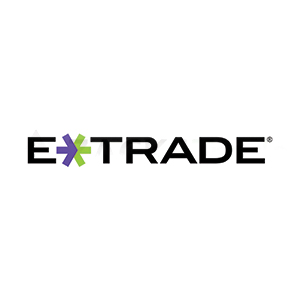 E*TRADE
E*TRADE
E*Trade offers financial services via online (2 separate platforms) and land based branches (30). The brokerage services at E*Trade are affordably priced. The company was a pioneer in electronic trade and in 1983 it executed the first electronic trade by individual investor. The platform enables trading in bonds, stocks, ETFs, mutual funds, futures and options.
The online platform provides a huge library of research information for portfolio creation, monitoring and rebalancing. It also provides stock market risk analysis. It features good portfolio building tools and a huge selection of mutual funds. Focusing on beginner and seasoned traders, E*Trade offers trading platforms of professional level. The zero commission for trades is an offer that active traders will definitely appreciate.
Account Tools & Features
E*Trade has diverse range of investment choices targeting active traders and for retirement based investors. The selection includes futures, options and over 4,400 mutual funds of no transaction fee type. The analysts at E*Trade give regular updates on special mutual funds alongside the top funds of no load type and the ETFs. The company does not have any international offerings and Forex trading is not present.
E*Trade provides 3 different trading platform namely E*Trade Web, E*Trade Pro and Power E*Trade. The standard web platform is for beginner investors who are looking to manage their portfolio. The platform allows trades, money transfers, checking of quotes in real time and research tools. You also get access to analyzers, optimizers and investment screeners. The Power platform is for advanced investors, while the pro is for experienced investors and is similar in form to the Power platform.
Fees and Pricing
E*Trade does not charge commission fee for trades on stock, ETF and options since October 2019. The contract charges for the options trading is present but reduced to $0.05 from the earlier $0.65. For customers trading over 30 times in a quarter or have over $250,000 as account balance, the contract commission is $0.05. Margin rates are high as with other top brokers. The platform does not charge transaction fee for most of its mutual funds and for mutual funds with transaction fee, the charge is $19.99.
Pros
- Tools are simple and convenient to use
- Customer support is good
- Mobile app is very advanced
- ETF, Options and stocks trades are free of commission fee
- Investment portfolio is large
Cons
- Website navigation is complicated
- Robo advisors are expensive
- Minimum deposit is high for availing bonus on account opening
Bottom line
E*Trade is ideal for beginners as well as active traders. The company allows choosing from three platforms that are customizable and have plenty of useful features. Non retirement accounts need a minimum balance for opening. The multiple trading options with zero commission offer simple and cheap portfolio diversification choice. The presence of online and mobile version makes it convenient for frequent traders.
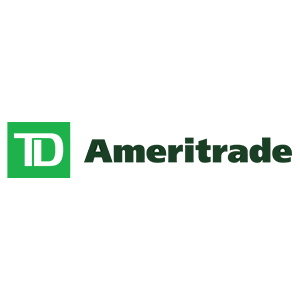 TD Ameritrade
TD Ameritrade
TD Ameritrade is a large online broker offering multiple platforms ranging from basic web platform to advanced thinkorswim platform for active traders. It merged with Scottrade adding about 3.5million customers. The platforms available for customers for trading and research are very extensive.
TD Ameritrade features competitive commission prices and no minimum accounts. It offers good customer service, mobile apps and a full service brokerage. Established in 1975, the company has more than 11 million broker accounts and client assets total to over $1 trillion. One third of the revenue for the brokerage comes from commissions. It offers instant support service via its live chat feature.
Account Tools & Features
TD Ameritrade provides commission free ETFs of over 300 and it also features a huge mutual fund selection of more than 12,000. When you use thinkorswim for options trading, you can use any spread up to a maximum of 8 legs.
Forex trading is also present with up to 75 currency pairs available for trading. The company also offers international exchanges through live broker feature. Tradable securities at TD Ameritrade include stocks, bonds, ETFs, mutual funds, futures, options, forex and IPOs.
Fees and Pricing
TD Ameritrade slashed its commission for trading from $6.95 to free trading for its options, ETF and stock trades. Options trades however carry a charge of $0.65 as pre contract free. Mutual funds have $49.99 charge. Penny stocks trading however still carry a charge of $6.95. Broker assisted trades have a charge of $44.99
Pros
- Research facilities are extensive and help in regular updates along with the regular news feeds
- Beginner investors will find the education tools informative for investing in diverse asset classes
- Zero commission for ETF and stock trades
- Customer support is good
- Large selection of investments
Cons
- Broker assisted trading fees are expensive
- Customers have to use more than one trading platform to access tools they need
- Website is too cramped with tools and content
Bottom line
TD Ameritrade is ideal for beginner and advanced traders. Fund investors and those looking for commission free trades and investor advice also find the platform a good choice. For those who value tools for research and screening and do not use margin for investment strategy will find TD Ameritrade a suitable choice.
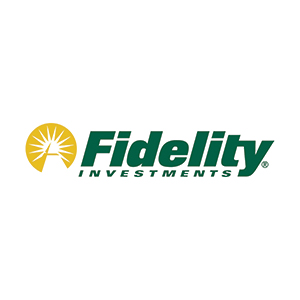 Fidelity
Fidelity
Fidelity investment brokerage is a leading platform offering comprehensive services for all types of investors. The platform helps manage portfolios professionally besides providing advisory services and wealth management services. Fidelity also has a robo advisor tool.
Established in 1946, Fidelity has earned a reputation of being a diversified provider of financial services. In 2017, the assets it manages worldwide was worth $2.45 trillion.
Fidelity is popular for its mutual funds earlier but has now branched out offering diversified investment tools and investment brokerage with highly competitive trading fees. The company has a robust offline presence with over 140 local branches besides its efficient online platform.
Account Tools & Features
Fidelity offers investments in options, stocks and ETFs. It has a large selection of mutual funds of more than 10,000 including non Fidelity and Fidelity funds. The company also provides CDs, secondary and new issue market bonds of over 40,000. The accounts available at Fidelity include managed accounts, brokerage accounts, traditional, Robo advisor, Roth and rollover IRA, 401 (k) plan for self employed and retirement accounts focused on investments.
The cash management Fidelity account has checking and ATM access. The account does not have any minimum balance stipulation and monthly fee is not charged. Fidelity app supports Apple, Android and Amazon devices. Trading platform includes research and screener features, advisory services and wealth management.
Fees and Pricing
Fidelity charges low fees for trading and non-trading services. Stock trading has no commission. However the fees charged for a few of the mutual funds and some financial rates are high. The company does not charge inactivity fee. The fees for non US stocks like German and UK stocks are higher at Fidelity.
Pros
- Commissions and fees are lowest
- Trade executions are done well
- Research on ETF is comprehensive
- Active Trader Pro available for all customers
Cons
- Users need to access more than one platform for making use of the tools they need
- Only US citizens are eligible for opening Fidelity account
Bottom line
As one among the largest stockbrokers in the US, Fidelity offers well regulated investment accounts supported by excellent research and tools such as trading guides and more. The web based trading platform is easy to navigate. The company covers non US markets, which is another advantage. However it is not a full digital service and the fees for mutual funds are also very high. In short, it is good for retirement investors and active traders with its strong trading platform and zero commission fees.
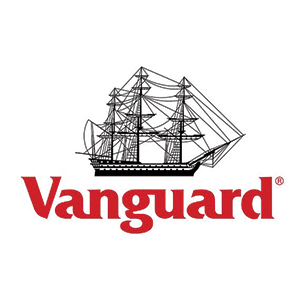 Vanguard
Vanguard
Vanguard is a personal advisor service offering professional financial planning, portfolio management and coaching services. Vanguard advisors are fiduciaries focused on helping investors arrive at informed decisions on their investments. Founded in 1975, by Jack Bogle, Vanguard focuses on assisting clients in their long term investments and retirement plans.
Vanguard began as a mutual fund with low cost owned by the individuals who invest in the fund. It was structured as a mutual fund establishment owned by its clients without any outside parties seeking profit from the funds. At present Vanguard assets under management is valued at $140 billion.
Account Tools & Features
The account minimum at Vanguard is $50,000 and it charges 0.3% of the managed assets. This makes the account minimum considerably high. However the account minimums cover services such as unlimited financial advisor access, which ensures the minimum amount earn users personalized advice.
The portfolios at Vanguard are customized to client requirements and use Vanguard funds primarily. The personal advisor service offers portfolio management of individual retirement accounts, trusts and brokerage account. Tax loss harvesting at Vanguard is personalized based on client requirements. The average investment expense ratio here is 0.08%
Fees and Pricing
Annual cost for the advisory services at Vanguard is 0.30% of assets managed of value up to $5 million. For assets over $5 million to $10 million, the fees is 0.20% and it is 0.10% for assets over $10 million to $25 million. The fee is 0.05% for assets over $25 million. For substantial assets, the annual fee is split up into 4 payments with $50,000 as minimum payment.
Pros
- Management fee is very affordable when compared to other online investment planning services
- Investment selection is huge
- Investment management is comprehensive
- Financial advisor access is provided
Cons
- The account minimum is very high
- Transaction fees are charged for some clients
- Account set up is very tedious
Bottom line
Vanguard is reputed for its low cost investment products and full service management of investment at 0.30% annual fees. The portfolios recommended by Vanguard funds are of low cost resulting in the account expense being around 0.5% or less overall. The straight forward fee structure, regular coaching and good asset management gives investors potentially superior returns. However for non-Vanguard asset classes the transaction cost and expense ratio may be high. No tax loss harvesting and expensive account minimum are drawbacks you should consider.
 Wealthsimple
Wealthsimple
Wealthsimple is a Canadian company established in 2014. Based in Toronto, the company has offices in London and New York. It is a robo advisor that has impressive presence in Canada, UK and US markets. The company assists its clients with good investment advice and offers human investment managers.
Wealthsimple has over $4billion assets under management and its global customer base is over 120,000. Wealthsimple clients are able to get help from a financial planner and also from expert portfolio managers. The product has a multiple level fee system focused on providing value for each and every client.
Account Tools & Features
Wealthsimple offers long term management of investment without any account minimum stipulation. Investment of client account is done in diversified ETF portfolio focusing on funds of low cost index. Services offered by the company include automatic rebalancing, tax loss harvesting and dividend reinvesting. The financial advisors at Wealth simple are readily available anytime you request their service. It also offers 401k assistance and accepts deposits automatically on monthly, biweekly and weekly basis. Other tools include portfolio review, halal investing portfolio, roundups and brokerage services exclusively for Canadians.
Fees and Pricing
The account fees charged at Wealthsimple are 0.50% on account balance of value less than $100,000 and 0.40% for accounts of value over $100,000. The socially responsible investments management fees or expense ratios are higher than the ETF average fees. The fee for non SRI portfolio is 0.09% to 0.12% while for SRI portfolios the cost is .25%.
Pros
- Comprehensive review of portfolio of other investment services
- No minimum balance
- Socially responsible investment (SRI) choices
- Human advisor access
Cons
- Tools for personal finance are limited
- Fees for account management is high
Bottom line
Beginner investors and those who are looking of socially responsible investment choices Wealthsimple is a good choice. The financial planner access, tax loss harvesting and customized large account portfolio are advantages that make Wealthsimple a top contender in the values based investments. For investors who have a minimum of $100,000 for investing Wealthsimple is a viable choice. However it is not for smaller investors.
Common Investment Account Questions
Here are the most popular questions that people have about starting or switching investment accounts.
Which investment accounts have the best returns?
The best returns on your investment depend on several factors, the most important of which is choosing the right account. At the outset, Wealthfront and Betterment are excellent options for beginners.
But Vanguard with its well-structured retirement funds is not far behind. However it requires a higher minimum balance than Betterment and Wealthfront.
Fidelity is another great option, which has the drawback of a more expensive retirement fund. But this may be due to the fact that the money is spread over 20 or more funds. The fees charged and how convenient the process is are also factors to consider.
What are the four types of investment accounts to avoid?
If you are just starting out on your investing, you need to steer clear of certain types of investment accounts. This is because some investments give you better returns when you gain more knowledge about the investment process, finance, business and accounting information.
Investing in mutual funds with high sales loads or expense ratio should be avoided as the fee charged will be taken out from the interest, dividends and capital gains you make from the funds. The next investment type to beware of is speculating on futures and stock options. The losses may be more than the amount you invested.
The third type is individual stock. Without proper knowledge about the company, its profits, debt/equity ratio and sustainable equity return details and similar other features you can stand to lose a lot.
Instead think of investing in diversified index funds. Similarly, private entities and securities with promise of high tax savings without any proven strategy also pose danger.
As far as investment accounts are concerned for beginner investors and active investors, accounts like Wealthfront and Betterment are ideal. Accounts like TD Ameritrade, Zacks Trade, E*Trade and Ally Invest are for advanced traders and for big investors.
What is the best investment account for monthly income?
Choosing low risk investments will help you minimize capital loss and earn a considerable amount via interest on the money. Choosing brokerage accounts like Ally Invest, E*Trade, TD Ameritrade for buying individual bonds, money market funds and preferred stock investments can help you earn good interest without worrying losing your principal due to market fluctuation.
If you are a beginner investor, Betterment, Wealthfront, Acorns, Fidelity and Vanguard also offer good choices because of the research, coaching and robo advisor features they offer. Betterment with no minimum investment and automated portfolios, Wealthfront with 0.25% annual fee on portfolios of value over $10,000 and Ally Invest with $100 minimum balance and no annual, rebalancing and advisory fees are apt choices to consider.
Opting for investment accounts that do not require sizeable opening balance and have easy automated investment system for increasing wealth are ideal investments to pick.
What is the best investment company for beginners?
As a beginner, you have to remember upfront that investing is a matter of personal preference. And whatever tools you choose can change as you become investment savvy, and when there is change in your earning levels.
That said, investment accounts like Wealthfront is a recommended choice for all beginner. This is because it provides all the learning tools needed for you to progress through your investing journey.
Other equally good options include Vanguard with its solid features in all investment categories. But it is a bit expensive. Betterment, however, is a more viable option as it has the best combination of no minimal balance and very low fees.
Other contenders include Fidelity, which offers managed investments, robo advisors and low cost stock trades. For long term investors interested in mutual fund and ETFs, Vanguard with its low expense ratios and extensive portfolio of no free funds.
Ally Invest is another ideal choice for new investors as the charges are free for majority of trades and it offers divers product range.
Recommendation
Hope our review and recommendation of the best investment accounts 2020 was informative and insightful. While choosing investment accounts it is best to look for accounts that are automated. This will make the process of building wealth easier. All the accounts listed above are popular and well sought after accounts because of their extensive features, simple process, affordable costs and tech savvy set up.
By considering important factors like, the management fees, expense ratios, type of account, investments, tax loss harvesting, rebalancing, socially responsible investing and human advisor access you can narrow down the choices listed and pick an investment that works for your specific financial situation.
For amateur investors, Wealthfront and Betterment offer good starting points. These are well established investment services that satisfy most of the basic requirements you need. With time you can branch out or switch accounts as you learn more about the process.
